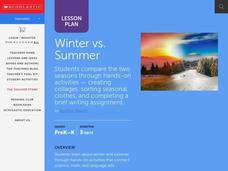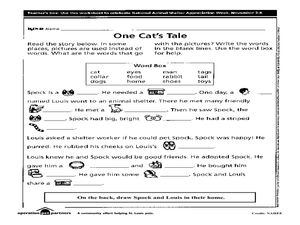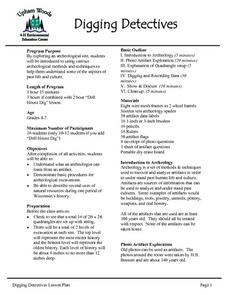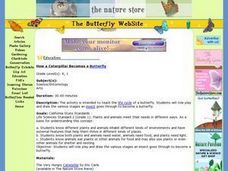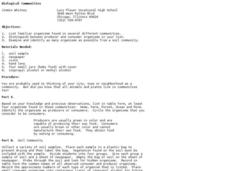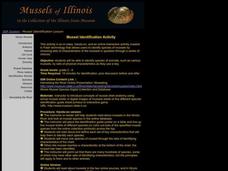Curated OER
Seasons
First graders investigate the four seasons of the year. In this seasons instructional activity, 1st graders identify the correct order of seasons, discover different climates, and examine how to dress appropriately for each season.
Curated OER
Marvelous Marshes of the Chesapeake
Third graders identify sources of salt water and fresh water that enter the Chesapeake Bay. They build a model watershed and describe how runoff enters the Bay.
Curated OER
Exploring Minerals
Students examine the differences between rocks and minerals. They discover the properties of different minerals and perform hardness tests on minerals. They collect their data and make observations.
Curated OER
Exploring the Jungles of Rousseau
Students explore the masterworks of Henri Rousseau and accurately interpret masterworks of Rousseau. Students effectively demonstrate visually and orally an understanding of the content of masterworks of Rousseau and thoughtfully reflect...
Curated OER
Winter vs. Summer
Students explore the seasons. In this winter and summer lesson, students read The Snowy Day by Ezra Jack Keats and Summer by Maria Ruis. Students compare the 2 seasons as they create t-charts, try on seasonal clothing, and create collages.
Curated OER
Fabulous Felines: How to Choose the Purrfect Cat
Students investigate the concept of pet care and cats. For this cat lesson, students discuss responsibilities for pet care and take a cat quiz. Students discuss where to get their cats and how to care for them. Students may visit an...
Curated OER
Thumbody Loves You
Students make thumbprints with stamp pads. In this art lesson, after making their thumbprints students put eyes, nose, mouth, hair, legs and arms on the thumbprint.
Curated OER
The Wonderful Pigs of Jillian Jiggs
First graders compare fictional and real pigs. In this pig comparison instructional activity, 1st graders read a fiction text then a non-fiction text on pigs. Students complete a K-W-L chart and fill out a Venn Diagram.
Curated OER
Friendly Letter Format
In this Westward Ho worksheet, students write a friendly letter and fill out a cause and effect chart for the story Westward Ho. Students complete 7 rows in the chart.
Curated OER
Scavenging the Sandy Shore
Students explore oceanography by examining a beach. In this living things lesson plan, students define the terms abiotic and biotic and practice identifying living and non-living things that have been previously found on a beach....
Curated OER
The Scientist in Me
Students make a poster. For this scientist lesson, students define the term scientist, draw pictures of themselves as scientists, and write about what they would study as a scientist.
Curated OER
Monster Math
Learners view projections of dinosaurs in order to comprehend their true size.
Curated OER
Digging Detectives
Students demonstrate basic procedures for archeological excavations. They explore an archeological site, students using various archeological methods and techniques to determine some of the aspects of past life and culture.
Curated OER
Creature Creation
Second graders listen to a read aloud of a fictional story about a frog. They compare the characteristics of the main character with a real frog. They work with two partners to create a creature; one student draw the head, one the body,...
Curated OER
Water Quality Monitoring
Pupils comprehend the four parameters of water quality. They perform tests for salinity, dissolved oxygen, pH and clarity or turbidity. Students comprehend why scientists and environmental managers monitor water uality and aquatic...
Curated OER
Plants
In this science worksheet, students investigate plants by first reading a paragraph of information. Students then choose a plant, illustrate and write about it.
Curated OER
The Chain Gang
Students perform a food chain simulation to determine what happens when a food chain is broken.
Curated OER
How a Caterpillar Becomes a Butterfly
Student role play and draw the various stages an insect goes through to become a butterfly. They discover the different stages of how a caterpillar becomes a butterfly. Students read The Very Hungry Caterpilla by Eric Carle.
Curated OER
On the Trail with Lewis and Clark
Eighth graders use the Internet to conduct research on the Lewis and Clark journals and work cooperatively in planning and delivering a presentation.
Curated OER
Biological Communities
Students identify consumers and producers in different communities. Students collect a variety of soil samples and record organisms found in the samples.
Curated OER
Glue-line Insect
First graders explore characteristics of ladybugs. They view ladybugs in ventilated containers and discuss their observations. Students read a story about ladybugs and create a glue picture of a ladybug.
Curated OER
Stratigraphy and Cross-Dating
Pupils interpret archaeological strata using the law of superposition. They apply cross-dating to determine the age of other artifacts.
Curated OER
The Magic School Bus Goes to Mussel Beach
Students participate in a hands-on activity where they explore tidal zones. They explore tides and marine life. This is an experiment that can be accomplished in class.
Curated OER
Mussel Identification Activity
Students participate in an activity in which they identify mussels by choosing a set of characteristics. They review the parts of a mussel before and after the activity. They complete a worksheet to finish the activity.






